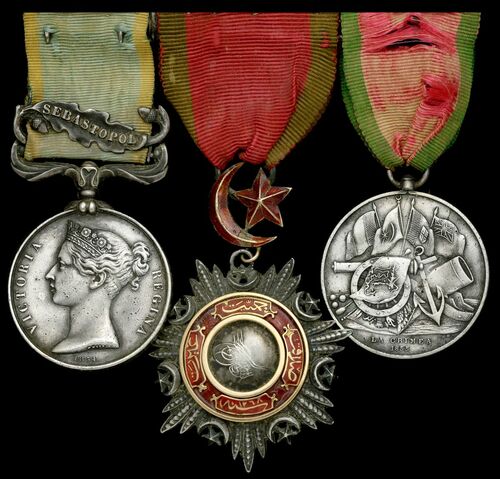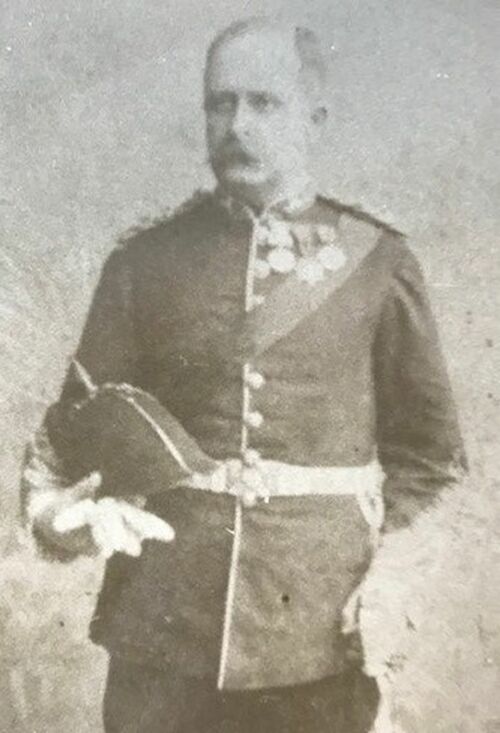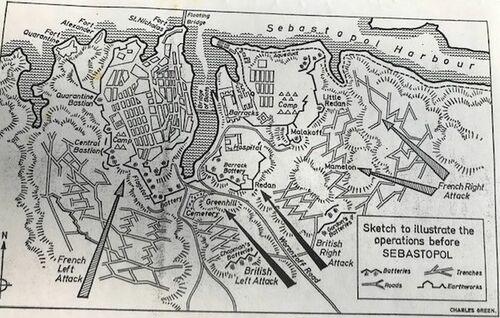Auction: 23111 - Orders, Decorations and Medals - e-Auction
Lot: 524
Three: Major-General J. Gibbons-Smyth, 39th Regiment of Foot, who was recommended for the Victoria Cross but only receiving an Order of Medjidie for his gallantry at the Redan
Crimea 1854-56, 1 clasp, Sebastopol, regimentally impressed (Lieut J. Gibbons Smyth 39th.. Regt. 8th September 1855.); Turkey, Ottoman Empire, Order of Medjidie, Knight's breast Badge; Turkish Crimea, a private purchase Sardinian die, mounted as worn, contact marks throughout and with some light enamel damge to the second, otherwise very fine (3)
Turkey, Order of Medjidie 5th Class London Gazette 2 March 1858.
M.I.D. Confirmed in the Army Lists but no entry found in the London Gazette.
James Gibbons Smyth was born on 21 February 1837 at Co. Westmeath, Ireland, and was the son of Reverend Thomas and Mary Ann Smyth. Ensign 25 August 1854; Lieutenant 9 February 1855; Captain 17 Nov 1863; Bt Major 1 October 1877; Major 23 January 1878; Bt Lt. Colonel 1 October 1878; Lt. Colonel 1 July 1881 with the 1st Dorsets; Colonel 1 July 1885; Colonel Half Pay 1 July 1887; Major General retd 25 October 1887.
Smyth was part of the 'second batch' of the 39th which came from the Depot Companies in Cork, Ireland. They arrived at Balaclava on the 6 February 1855 on Princess Royal comprising a total strength of nine Officers and 184 Men under the command of Major Tinley.
He took part in the Siege and Fall of Sebasopol and was involved in an attack on the Redan on the 18 June 1855 with the following extract from the Regimental History:
'That evening the Thirty-Ninth took over the trenches in the Dockyard Ravine which had been captured by Eyre's brigade of the Third Division. While they were consolidating these Lt. Smyth, going round the advanced line, heard cries of distress and accordingly went out to investigate, accompanied by Ptes. Lind and McCluskey, who volunteered to help him. Close to the Russian lines they found a badly wounded Sergeant of the 38th and, despite a heavy fire, brought him safely in. Lind eventually received the Sardinian War Medal and McCluskey the French, Lt. Smyth, who subsequently commanded the battalion from 1884 to 1887, being recommended for the newly established Victoria Cross.' (He actually received the Turkish Order of Medjidie, 5th Class)
He was further involved in the attack on 8 September 1855 and was additionally mentioned in despatches. The 39th left the Crimea for Canada on 1 May 1856 on Simoon arriving at Quebec on 26 June 1856, they were the first regiment to leave the Crimea. The regiment left Canada for Bermuda on 2 October 1859, although Smyth left on 2 May 1860, the Regiment stayed in Bermuda until 26 July 1864. On returning to the UK the regiment were stationed at Aldershot (North Camp) then to Dover from August 1865 with movement throughout the UK over the next four years.
On 14 September 1869 two companies of the Regiment left for India. Smyth followed with the ten 'service companies' departing on 6 October 1869. The second batch included 39 Officers and staff, 46 Sergeants, 21 Drummers, 761 rank and file (plus 103 women and children). They sailed on Crocodile to Alexandria, by Suez and Jumna to Bombay. Smyth remained in India for an extended stay and succeeded to the Majority after completing 23 years of service. He married Eleanor, daughter of Colonel Powell in 1875. In 1901 he was living at 8 Oakley Street, Chelsea. He died at Alverstoke, Hampshire on 18 January 1914.
Subject to 20% VAT on Buyer’s Premium. For more information please view Terms and Conditions for Buyers.
Sold for
£1,400
Starting price
£420









